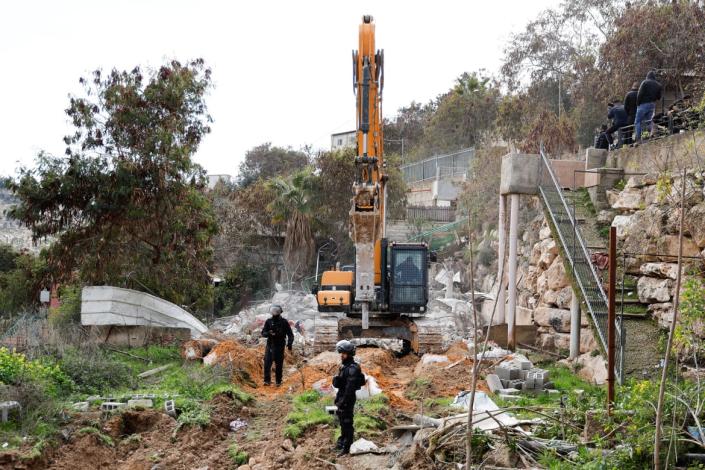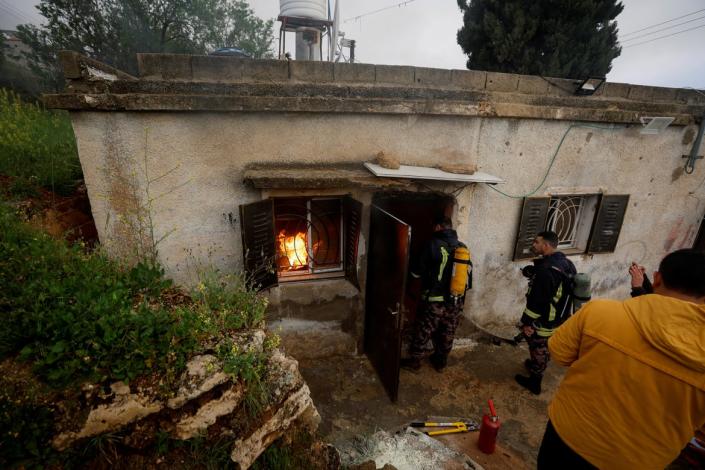Mel Frykberg, Daily Beast, March 27, 2023

An American senior citizen allegedly suffered a potentially fatal attack in the West Bank as part of a surge in violence that has gripped the Israeli-occupied region since Benjamin Netanyahu returned to power at the head of an extreme right-wing coalition.
Local residents told The Daily Beast that Israeli settlers—who are trying to take over Palestinian land—have been emboldened by the radical rhetoric and extremist policies promoted by the new government. Villagers say attacks have become a daily hazard and the Israeli police and military have done little to protect them.
An American mother of two from Wisconsin was caught up in the violence this month. Cassandra Auren, 65, was hospitalized for two days and required six stitches after she suffered a fractured skull and internal bleeding. She told The Daily Beast that she was struck on the head by an Israeli settler with a long wooden stick as she was visiting the village of Tuba in the Massafer Yatta area south of Hebron.
“The attack by the male settler, who had a small child with him, took me totally by surprise as there was no prior confrontation and no provocation on my part. It all happened so fast I had no time to think about whether my life was in danger,” said Auren, a residential carpenter who traveled to the region as a peace activist.
In a video seen by The Daily Beast, another settler armed with a metal pole chased Auren and an Italian woman who was with her.
The doctor’s report said there was a fracture and external bleeding at the site of the trauma. The CT scan showed right subdural hematoma, 3mm in thickness. And the doctor reported decreased hearing in her left ear and said that she continues to suffer from severe headaches. “When I came around my head was painful and I was dizzy.”
A video frame grab shows an Israeli settler chasing Auren.
Although the incident has shaken her badly she has continued to visit the village and remains angry that this behavior often goes unreported.
“I now understand the fear that Palestinians feel all the time, especially the women and children, because at night I also get afraid that the settlers might attack again,” said Auren.
The ancient Hebron hills—with their winding roads that snake around orchards and agricultural fields—have an unmistakable rugged beauty. Generations of Palestinians living in villages and hamlets that dot the territory have earned their living from the land here for hundreds of years. But the unspoilt views can be deceptive—they are hiding a dark side.
Ali Awad, from the village of Tuba in Massafer Yatta, told The Daily Beast that his family and all the other residents are being threatened with expulsion but their livelihoods would be destroyed and they have nowhere else to go.
“Settlers have become emboldened in the last few months and carry out nearly daily attacks on the villages. And if we complain to the police or army when they arrive, we are arrested and told that the land no longer belongs to us and that we have to leave the land,” Awad said.
Cassandra Auren’s head injury.
Last Thursday, he said a Palestinian who confronted a settler on his land was bitten in the face and teargassed while the Israeli army stood by, with residents accusing the settlers of a deliberate policy of intimidation to drive them off their land.
The daily settler attacks have been an ongoing problem for years but with Israel’s new extreme right-wing government their behavior has been given the green light.
As the settlers expropriate more and more land, Palestinian children who used to travel to school in the nearby hamlet of At-Tuwani have been forced to take circuitous routes, accompanied by an Israeli military escort to avoid settlers from the nearby Israeli outpost of Havat Maon attacking them.
“Sometimes the Israeli soldiers show up and sometimes they don’t, it depends on their mood,” said Awad, a local journalist.
A Palestinian shows papers during a protest against settlements in Masafer Yatta near Hebron, in the Israeli-occupied West Bank, Jan. 20, 2023. (Mussa Qawasma/Reuters)
Tuba villagers’ journey to the nearest town in the area, Yatta, used to be just over a mile but to avoid the growing Israeli settlements, outposts and potential attacks from the settlers it is now a seven-mile trip.
Approximately 2,500 Palestinians residing in Massafer Yatta, which comprises about 15 villages and hamlets spanning 7,000 hectares, are facing forced removal following an Israeli Supreme Court ruling last May that the area could continue to be used as a military firing zone.
Their forced removal would be the biggest transfer of Palestinians since 1967 when Israel occupied the West Bank—an occupation that is considered illegal under international law.
“Forcible transfer of protected persons in occupied territory is a war crime,” the Israeli human rights organisation B’Tselem says.
Massafer Yatta falls into Area C of the West Bank which comprises 60 percent of the territory and is under full Israeli control and is mostly reserved for Israeli settlers through the destruction of Palestinian infrastructure and their forced removal.
The UN Office for the Coordination of Humanitarian Affairs (Ocha) reported that in 2022, 953 Palestinian structures were demolished or seized across the West Bank, including East Jerusalem, the highest number since 2016.
Israeli security forces stand guard near a bulldozer after Israeli police demolished structures in Jabal Al-Mukaber in East Jerusalem, Feb. 13, 2023. (Ammar Awad/Reuters)
And it is not only Palestinian activists who are afraid as they fight for justice.
Oriel Eisner, an Israeli-American activist and director of the Center for Jewish Nonviolence, told The Daily Beast that over the last few months the situation had deteriorated, particularly in the south Hebron hills.
“The settlers are going into the Palestinian hills every single day and the army and police, while they never used to do much about it, are even less effective now,” said Eisner, who has been arrested and attacked by settlers several times.
“The army seems to be in lockstep with the settlers.”
“What I fear now is the veneer of privilege and protection I carry and try to leverage as a Jewish-Israeli citizen with the new government doesn’t mean anything because basically the actions they are now willing to take are things that were unthinkable a few months ago,” said Eisner.
His biggest fear, however, is for the Palestinians who will lose their villages and will not be able to fight their displacement.
Firefighters work at a Palestinian house which Palestinians say was attacked by Israeli settlers near Ramallah in the Israeli-occupied West Bank, March 26, 2023. (Mohammed Torokman/Reuters)
In the interim the villagers are living with continued shooting and military exercises in the background as helicopters overhead scare their flocks Meanwhile, with most buildings earmarked for demolition, they wait for the next invasion that will drive them off their land.
Twenty percent of the occupied West Bank has been set aside as military firing zones. But recent reports claim this was always part of a bigger plan of land expropriation from the indigenous population.
An Israel Police spokesman told The Daily Beast that a settler had been arrested and his detention extended after he appeared in court.
While Auren received far better treatment than Palestinians who try to make legal complaints, the statistics suggest the alleged attacker is unlikely to ever face justice.
According to Israeli rights group Yesh Din, 93 percent of all investigations into ideologically motivated crime by settlers against Palestinians in the West Bank are closed without an indictment.
“Of the 1,531 concluded investigations Yesh Din monitored since 2005, indictments were filed in just 107 cases and only 3 percent of cases led to convictions,” said Yesh Din.
The Wisconsin Network for Peace & Justice reports that Senator Tammy Baldwin has been in touch with the U.S. State Department urging them to push for justice in the case.
Auren says the alleged attack on her on March 7 highlights the brutal way Palestinians are treated. She hopes the U.S. might start to take the issue more seriously.
“My reason for coming here was my interest in the fact that the U.S. gives Israel about $8 million dollars a day in military aid,” she said. “I feel responsible for how those dollars of mine are spent and am shocked that the world allows the abuse of Palestinians to continue, especially the U.S. given our relationship with Israel.”





Leave a Reply
You must be logged in to post a comment.